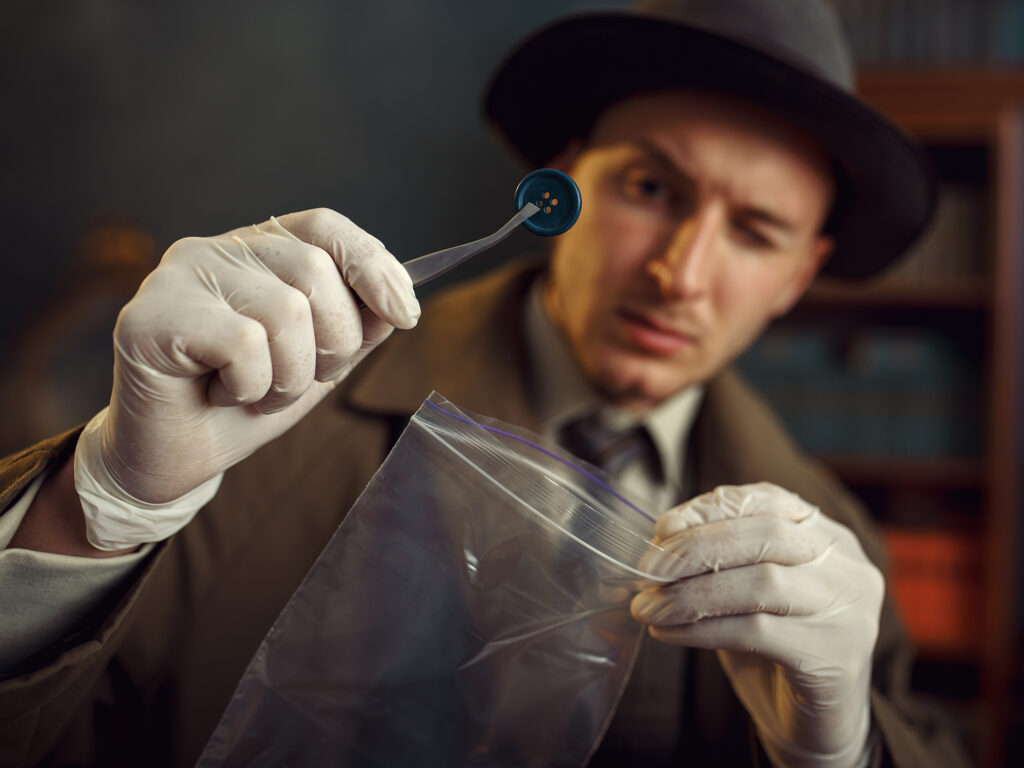Useful English Words We Learned From Sherlock Holmes

If you've ever wondered whether you could learn English from Sherlock Holmes, the answer is "yes!" For this post, we've picked the most useful words from his adventures and we'll show you how they're used in the real world today.
1. Detective (n.)
Sherlock Holmes is a detective. A detective is someone who uses clues to solve crimes.

In real life, detectives are usually members of the police. For example, the Detective Inspector mentioned in the following news article is a police detective in Merseyside, England.
Detective Inspector Lee Wilkinson of Merseyside Police said that Stewart was caught because of his "love of Stilton cheese."
"Cheese Photo Helps Police Catch Criminal" | Engoo Daily News
On the other hand, Sherlock Holmes is a "private detective." This means he can work for anyone who wants to hire him. These days, private detectives are more often called "private investigators" ("PI" for short).
2. Investigate (v.)
Sherlock investigates deaths, robberies, and other kinds of mysteries. This means he tries to find out what really happened and who is responsible. We often use this word to talk about police looking into situations like crimes and traffic accidents.
German police say a special team of 20 officers has been put together to investigate the crime.
"Thieves Steal Priceless Jewelry from German Museum" | Engoo Daily News
The police aren't the only people who make investigations. For example, companies investigate complaints and journalists investigate issues that most people aren't familiar with.
An investigation by The Times has found that many students at UK universities are using drugs to help their academic performance.
"Use of 'Study Drugs' Common in UK Universities" | Engoo Daily News
This type of journalism is known as "investigative journalism" and it often uncovers shocking secrets. A famous example is the Pandora Papers, which revealed where rich and powerful people hide their money.
3. Case (n.)
In his long career as a detective, Sherlock solves many cases of murder, theft, disappearances, and more. In this context, a "case" is "an incident that is being investigated." For example:
- A school might investigate a case of bullying.
- A government might investigate a case of bribery.
- Sports organizations might investigate cases of doping.
When the police are working on a case, we say they are "on" it: e.g. "20 police officers are on the case." In order to solve the case, the police will ask a suspect a lot of questions and sometimes even arrest them.
So if you feel like someone wants something from you and keeps bothering you about it, you can say they're "on your case." For example, if a friend tells you, "My mom is always on my case about getting married," that probably means their mom is constantly asking them when they're going to get married.
4. Evidence (n.)
Sherlock is famous for using fingerprints, footprints, and handwriting as evidence of crimes. "Evidence" is "a fact or an object that shows that something is true." Anything left at a crime scene, from bloody knives to a button that fell off of someone's coat, can be used as evidence.

Besides crime, the word "evidence" also appears a lot in science. After all, scientists need all the evidence they can get to figure out the mysteries of our world.
The footprints found in the Nefud Desert ... are the earliest evidence of humans in the area.
"120,000-Year-Old Human Footprints Found in Saudi Arabia" | Engoo Daily News
There is little evidence that sleep medication has any benefit after several months.
"Study: Medication May Not Help Long-Term Sleep" | Engoo Daily News
Keep in mind that "evidence" is an uncountable noun.
- Police found a new piece of evidence yesterday. [
a new evidence] - Police found new evidence yesterday. [
evidences] - There was no evidence against him. [
There were no evidences]
5. Examine (v.)
"Examine" means "to look at something closely to learn more about it." Sherlock Holmes examines things to find clues. For example, he might examine someone's handwriting with a magnifying glass to figure out if they're male or female.

You have probably examined a contract to see whether you are OK with all the terms and conditions. And a doctor has probably examined you before to make sure you're healthy.
Want to Learn More Words from Sherlock?
At Engoo, we have thousands of professional online tutors who can show you how words from your favorite English books and movies are used in real life. And if you just want to talk about your favorite detective, you can even find tutors who are Sherlock fans themselves. Sign up here!



